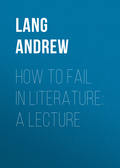
Lang Andrew
The Violet Fairy Book
‘Wonderful,’ said he; ‘I couldn’t have believed it possible. However, the hardest is yet to come, as you will see to-morrow.’
Jesper thought so too when the next day’s task was set before him. The king’s gamekeepers had caught a hundred live hares, which were to be let loose in a large meadow, and there Jesper must herd them all day, and bring them safely home in the evening: if even one were missing, he must give up all thought of marrying the princess. Before he had quite grasped the fact that this was an impossible task, the keepers had opened the sacks in which the hares were brought to the field, and, with a whisk of the short tail and a flap of the long ears, each one of the hundred flew in a different direction.
‘Now,’ said the king, ‘as he walked away, ‘let’s see what your cleverness can do here.’
Jesper stared round him in bewilderment, and having nothing better to do with his hands, thrust them into his pockets, as he was in the habit of doing. Here he found something which turned out to be the whistle given to him by the old woman. He remembered what she had said about the virtues of the whistle, but was rather doubtful whether its powers would extend to a hundred hares, each of which had gone in a different direction and might be several miles distant by this time. However, he blew the whistle, and in a few minutes the hares came bounding through the hedge on all the four sides of the field, and before long were all sitting round him in a circle. After that, Jesper allowed them to run about as they pleased, so long as they stayed in the field.
The king had told one of the keepers to hang about for a little and see what became of Jesper, not doubting, however, that as soon as he saw the coast clear he would use his legs to the best advantage, and never show face at the palace again. It was therefore with great surprise and annoyance that he now learned of the mysterious return of the hares and the likelihood of Jesper carrying out his task with success.
‘One of them must be got out of his hands by hook or crook,’ said he. ‘I’ll go and see the queen about it; she’s good at devising plans.’
A little later, a girl in a shabby dress came into the field and walked up to Jesper.
‘Do give me one of those hares,’ she said; ‘we have just got visitors who are going to stay to dinner, and there’s nothing we can give them to eat.’
‘I can’t,’ said Jesper. ‘For one thing, they’re not mine; for another, a great deal depends on my having them all here in the evening.’
But the girl (and she was a very pretty girl, though so shabbily dressed) begged so hard for one of them that at last he said:
‘Very well; give me a kiss and you shall have one of them.’
He could see that she didn’t quite care for this, but she consented to the bargain, and gave him the kiss, and went away with a hare in her apron. Scarcely had she got outside the field, however, when Jesper blew his whistle, and immediately the hare wriggled out of its prison like an eel, and went back to its master at the top of its speed.
Not long after this the hare-herd had another visit. This time it was a stout old woman in the dress of a peasant, who also was after a hare to provide a dinner for unexpected visitors. Jesper again refused, but the old lady was so pressing, and would take no refusal, that at last he said:
‘Very well, you shall have a hare, and pay nothing for it either, if you will only walk round me on tiptoe, look up to the sky, and cackle like a hen.’
‘Fie,’ said she; ‘what a ridiculous thing to ask anyone to do; just think what the neighbours would say if they saw me. They would think I had taken leave of my senses.’
‘Just as you like,’ said Jesper; ‘you know best whether you want the hare or not.’
There was no help for it, and a pretty figure the old lady made in carrying out her task; the cackling wasn’t very well done, but Jesper said it would do, and gave her the hare. As soon as she had left the field, the whistle was sounded again, and back came long-legs-and-ears at a marvellous speed.
The next to appear on the same errand was a fat old fellow in the dress of a groom: it was the royal livery he wore, and he plainly thought a good deal of himself.
‘Young man,’ said he, ‘I want one of those hares; name your price, but I MUST have one of them.’
‘All right,’ said Jesper; ‘you can have one at an easy rate. Just stand on your head, whack your heels together, and cry “Hurrah,” and the hare is yours.’
‘Eh, what!’ said the old fellow; ‘ME stand on my head, what an idea!’
‘Oh, very well,’ said Jesper, ‘you needn’t unless you like, you know; but then you won’t get the hare.’
It went very much against the grain, one could see, but after some efforts the old fellow had his head on the grass and his heels in the air; the whacking and the ‘Hurrah’ were rather feeble, but Jesper was not very exacting, and the hare was handed over. Of course, it wasn’t long in coming back again, like the others.
Evening came, and home came Jesper with the hundred hares behind him. Great was the wonder over all the palace, and the king and queen seemed very much put out, but it was noticed that the princess actually smiled to Jesper.
‘Well, well,’ said the king; ‘you have done that very well indeed. If you are as successful with a little task which I shall give you to-morrow we shall consider the matter settled, and you shall marry the princess.’
Next day it was announced that the task would be performed in the great hall of the palace, and everyone was invited to come and witness it. The king and queen sat on their thrones, with the princess beside them, and the lords and ladies were all round the hall. At a sign from the king, two servants carried in a large empty tub, which they set down in the open space before the throne, and Jesper was told to stand beside it.
‘Now,’ said the king, ‘you must tell us as many undoubted truths as will fill that tub, or you can’t have the princess.’
‘But how are we to know when the tub is full?’ said Jesper.
‘Don’t you trouble about that,’ said the king; ‘that’s my part of the business.’
This seemed to everybody present rather unfair, but no one liked to be the first to say so, and Jesper had to put the best face he could on the matter, and begin his story.
‘Yesterday,’ he said, ‘when I was herding the hares, there came to me a girl, in a shabby dress, and begged me to give her one of them. She got the hare, but she had to give me a kiss for it; AND THAT GIRL WAS THE PRINCESS. Isn’t that true?’ said he, looking at her.
The princess blushed and looked very uncomfortable, but had to admit that it was true.
‘That hasn’t filled much of the tub,’ said the king. ‘Go on again.’
‘After that,’ said Jesper, ‘a stout old woman, in a peasant’s dress, came and begged for a hare. Before she got it, she had to walk round me on tiptoe, turn up her eyes, and cackle like a hen; AND THAT OLD WOMAN WAS THE QUEEN. Isn’t that true, now?’
The queen turned very red and hot, but couldn’t deny it.
‘H-m,’ said the king; ‘that is something, but the tub isn’t full yet.’ To the queen he whispered, ‘I didn’t think you would be such a fool.’
‘What did YOU do?’ she whispered in return.
‘Do you suppose I would do anything for HIM?’ said the king, and then hurriedly ordered Jesper to go on.
‘In the next place,’ said Jesper, ‘there came a fat old fellow on the same errand. He was very proud and dignified, but in order to get the hare he actually stood on his head, whacked his heels together, and cried “Hurrah”; and that old fellow was the – ’
‘Stop, stop,’ shouted the king; ‘you needn’t say another word; the tub is full.’ Then all the court applauded, and the king and queen accepted Jesper as their son-in-law, and the princess was very well pleased, for by this time she had quite fallen in love with him, because he was so handsome and so clever. When the old king got time to think over it, he was quite convinced that his kingdom would be safe in Jesper’s hands if he looked after the people as well as he herded the hares.
(Scandinavian.)
THE UNDERGROUND WORKERS
On a bitter night somewhere between Christmas and the New Year, a man set out to walk to the neighbouring village. It was not many miles off, but the snow was so thick that there were no roads, or walls, or hedges left to guide him, and very soon he lost his way altogether, and was glad to get shelter from the wind behind a thick juniper tree. Here he resolved to spend the night, thinking that when the sun rose he would be able to see his path again.
So he tucked his legs snugly under him like a hedgehog, rolled himself up in his sheepskin, and went to sleep. How long he slept, I cannot tell you, but after awhile he became aware that some one was gently shaking him, while a stranger whispered, ‘My good man, get up! If you lie there any more, you will be buried in the snow, and no one will ever know what became of you.’
The sleeper slowly raised his head from his furs, and opened his heavy eyes. Near him stood a long thin man, holding in his hand a young fir tree taller than himself. ‘Come with me,’ said the man, ‘a little way off we have made a large fire, and you will rest far better there than out upon this moor.’ The sleeper did not wait to be asked twice, but rose at once and followed the stranger. The snow was falling so fast that he could not see three steps in front of him, till the stranger waved his staff, when the drifts parted before them. Very soon they reached a wood, and saw the friendly glow of a fire.
‘What is your name?’ asked the stranger, suddenly turning round.
‘I am called Hans, the son of Long Hans,’ said the peasant.
In front of the fire three men were sitting clothed in white, just as if it was summer, and for about thirty feet all round winter had been banished. The moss was dry and the plants green, while the grass seemed all alive with the hum of bees and cockchafers. But above the noise the son of Long Hans could hear the whistling of the wind and the crackling of the branches as they fell beneath the weight of the snow.
‘Well! you son of Long Hans, isn’t this more comfortable than your juniper bush?’ laughed the stranger, and for answer Hans replied he could not thank his friend enough for having brought him here, and, throwing off his sheepskin, rolled it up as a pillow. Then, after a hot drink which warmed both their hearts, they lay down on the ground. The stranger talked for a little to the other men in a language Hans did not understand, and after listening for a short time he once more fell asleep.
When he awoke, neither wood nor fire was to be seen, and he did not know where he was. He rubbed his eyes, and began to recall the events of the night, thinking he must have been dreaming; but for all that, he could not make out how he came to be in this place.
Suddenly a loud noise struck on his ear, and he felt the earth tremble beneath his feet. Hans listened for a moment, then resolved to go towards the place where the sound came from, hoping he might come across some human being. He found himself at length at the mouth of a rocky cave in which a fire seemed burning. He entered, and saw a huge forge, and a crowd of men in front of it, blowing bellows and wielding hammers, and to each anvil were seven men, and a set of more comical smiths could not be found if you searched all the world through! Their heads were bigger than their little bodies, and their hammers twice the size of themselves, but the strongest men on earth could not have handled their iron clubs more stoutly or given lustier blows.
The little blacksmiths were clad in leather aprons, which covered them from their necks to their feet in front, and left their backs naked. On a high stool against the wall sat the man with the pinewood staff, watching sharply the way the little fellows did their work, and near him stood a large can, from which every now and then the workers would come and take a drink. The master no longer wore the white garments of the day before, but a black jerkin, held in its place by a leathern girdle with huge clasps.
From time to time he would give his workmen a sign with his staff, for it was useless to speak amid such a noise.
If any of them had noticed that there was a stranger present they took no heed of him, but went on with what they were doing. After some hours’ hard labour came the time for rest, and they all flung their hammers to the ground and trooped out of the cave.
Then the master got down from his seat and said to Hans:
‘I saw you come in, but the work was pressing, and I could not stop to speak to you. To-day you must be my guest, and I will show you something of the way in which I live. Wait here for a moment, while I lay aside these dirty clothes.’ With these words he unlocked a door in the cave, and bade Hans pass in before him.
Oh, what riches and treasures met Hans’ astonished eyes! Gold and silver bars lay piled on the floor, and glittered so that you could not look at them! Hans thought he would count them for fun, and had already reached the five hundred and seventieth when his host returned and cried, laughing:
‘Do not try to count them, it would take too long; choose some of the bars from the heap, as I should like to make you a present of them.’
Hans did not wait to be asked twice, and stooped to pick up a bar of gold, but though he put forth all his strength he could not even move it with both hands, still less lift it off the ground.
‘Why, you have no more power than a flea,’ laughed the host; ‘you will have to content yourself with feasting your eyes upon them!’
So he bade Hans follow him through other rooms, till they entered one bigger than a church, filled, like the rest, with gold and silver. Hans wondered to see these vast riches, which might have bought all the kingdoms of the world, and lay buried, useless, he thought, to anyone.
‘What is the reason,’ he asked of his guide, ‘that you gather up these treasures here, where they can do good to nobody? If they fell into the hands of men, everyone would be rich, and none need work or suffer hunger.’
‘And it is exactly for that reason,’ answered he, ‘that I must keep these riches out of their way. The whole world would sink to idleness if men were not forced to earn their daily bread. It is only through work and care that man can ever hope to be good for anything.’
Hans stared at these words, and at last he begged that his host would tell him what use it was to anybody that this gold and silver should lie mouldering there, and the owner of it be continually trying to increase his treasure, which already overflowed his store rooms.
‘I am not really a man,’ replied his guide, ‘though I have the outward form of one, but one of those beings to whom is given the care of the world. It is my task and that of my workmen to prepare under the earth the gold and silver, a small portion of which finds its way every year to the upper world, but only just enough to help them carry on their business. To none comes wealth without trouble: we must first dig out the gold and mix the grains with earth, clay, and sand. Then, after long and hard seeking, it will be found in this state, by those who have good luck or much patience. But, my friend, the hour of dinner is at hand. If you wish to remain in this place, and feast your eyes on this gold, then stay till I call you.’
In his absence Hans wandered from one treasure chamber to another, sometimes trying to break off a little lump of gold, but never able to do it. After awhile his host came back, but so changed that Hans could not believe it was really he. His silken clothes were of the brightest flame colour, richly trimmed with gold fringes and lace; a golden girdle was round his waist, while his head was encircled with a crown of gold, and precious stones twinkled about him like stars in a winter’s night, and in place of his wooden stick he held a finely worked golden staff.
The lord of all this treasure locked the doors and put the keys in his pocket, then led Hans into another room, where dinner was laid for them. Table and seats were all of silver, while the dishes and plates were of solid gold. Directly they sat down, a dozen little servants appeared to wait on them, which they did so cleverly and so quickly that Hans could hardly believe they had no wings. As they did not reach as high as the table, they were often obliged to jump and hop right on to the top to get at the dishes. Everything was new to Hans, and though he was rather bewildered he enjoyed himself very much, especially when the man with the golden crown began to tell him many things he had never heard of before.
‘Between Christmas and the New Year,’ said he, ‘I often amuse myself by wandering about the earth watching the doings of men and learning something about them. But as far as I have seen and heard I cannot speak well of them. The greater part of them are always quarrelling and complaining of each other’s faults, while nobody thinks of his own.’
Hans tried to deny the truth of these words, but he could not do it, and sat silent, hardly listening to what his friend was saying. Then he went to sleep in his chair, and knew nothing of what was happening.
Wonderful dreams came to him during his sleep, where the bars of gold continually hovered before his eyes. He felt stronger than he had ever felt during his waking moments, and lifted two bars quite easily on to his back. He did this so often that at length his strength seemed exhausted, and he sank almost breathless on the ground. Then he heard the sound of cheerful voices, and the song of the blacksmiths as they blew their bellows – he even felt as if he saw the sparks flashing before his eyes. Stretching himself, he awoke slowly, and here he was in the green forest, and instead of the glow of the fire in the underworld the sun was streaming on him, and he sat up wondering why he felt so strange.
At length his memory came back to him, and as he called to mind all the wonderful things he had seen he tried in vain to make them agree with those that happen every day. After thinking it over till he was nearly mad, he tried at last to believe that one night between Christmas and the New Year he had met a stranger in the forest, and had slept all night in his company before a big fire; the next day they had dined together, and had drunk a great deal more than was good for them – in short, he had spent two whole days revelling with another man. But here, with the full tide of summer around him, he could hardly accept his own explanation, and felt that he must have been the plaything or sport of some magician.
Near him, in the full sunlight, were the traces of a dead fire, and when he drew close to it he saw that what he had taken for ashes was really fine silver dust, and that the half burnt firewood was made of gold.
Oh, how lucky Hans thought himself; but where should he get a sack to carry his treasure home before anyone else found it? But necessity is the mother of invention: Hans threw off his fur coat, gathered up the silver ashes so carefully in it that none remained behind, laid the gold sticks on top, and tied up the bag thus made with his girdle, so that nothing should fall out. The load was not, in point of fact, very heavy, although it seemed so to his imagination, and he moved slowly along till he found a safe hiding-place for it.
In this way Hans suddenly became rich – rich enough to buy a property of his own. But being a prudent man, he finally decided that it would be best for him to leave his old neighbourhood and look for a home in a distant part of the country, where nobody knew anything about him. It did not take him long to find what he wanted, and after he had paid for it there was plenty of money left over. When he was settled, he married a pretty girl who lived near by, and had some children, to whom on his death-bed he told the story of the lord of the underworld, and how he had made Hans rich.
(Ehstnische Marchen.)
THE HISTORY OF DWARF LONG NOSE
It is a great mistake to think that fairies, witches, magicians, and such people lived only in Eastern countries and in such times as those of the Caliph Haroun Al-Raschid. Fairies and their like belong to every country and every age, and no doubt we should see plenty of them now – if we only knew how.
In a large town in Germany there lived, some couple of hundred years ago, a cobbler and his wife. They were poor and hard-working. The man sat all day in a little stall at the street corner and mended any shoes that were brought him. His wife sold the fruit and vegetables they grew in their garden in the Market Place, and as she was always neat and clean and her goods were temptingly spread out she had plenty of customers.
The couple had one boy called Jem. A handsome, pleasant-faced boy of twelve, and tall for his age. He used to sit by his mother in the market and would carry home what people bought from her, for which they often gave him a pretty flower, or a slice of cake, or even some small coin.
One day Jem and his mother sat as usual in the Market Place with plenty of nice herbs and vegetables spread out on the board, and in some smaller baskets early pears, apples, and apricots. Jem cried his wares at the top of his voice:
‘This way, gentlemen! See these lovely cabbages and these fresh herbs! Early apples, ladies; early pears and apricots, and all cheap. Come, buy, buy!’
As he cried an old woman came across the Market Place. She looked very torn and ragged, and had a small sharp face, all wrinkled, with red eyes, and a thin hooked nose which nearly met her chin. She leant on a tall stick and limped and shuffled and stumbled along as if she were going to fall on her nose at any moment.
In this fashion she came along till she got to the stall where Jem and his mother were, and there she stopped.
‘Are you Hannah the herb seller?’ she asked in a croaky voice as her head shook to and fro.
‘Yes, I am,’ was the answer. ‘Can I serve you?’
‘We’ll see; we’ll see! Let me look at those herbs. I wonder if you’ve got what I want,’ said the old woman as she thrust a pair of hideous brown hands into the herb basket, and began turning over all the neatly packed herbs with her skinny fingers, often holding them up to her nose and sniffing at them.
The cobbler’s wife felt much disgusted at seeing her wares treated like this, but she dared not speak. When the old hag had turned over the whole basket she muttered, ‘Bad stuff, bad stuff; much better fifty years ago – all bad.’
This made Jem very angry
‘You are a very rude old woman,’ he cried out. ‘First you mess all our nice herbs about with your horrid brown fingers and sniff at them with your long nose till no one else will care to buy them, and then you say it’s all bad stuff, though the duke’s cook himself buys all his herbs from us.’
The old woman looked sharply at the saucy boy, laughed unpleasantly, and said:
‘So you don’t like my long nose, sonny? Well, you shall have one yourself, right down to your chin.’
As she spoke she shuffled towards the hamper of cabbages, took up one after another, squeezed them hard, and threw them back, muttering again, ‘Bad stuff, bad stuff.’
‘Don’t waggle your head in that horrid way,’ begged Jem anxiously. ‘Your neck is as thin as a cabbage-stalk, and it might easily break and your head fall into the basket, and then who would buy anything?’
‘Don’t you like thin necks?’ laughed the old woman. ‘Then you sha’n’t have any, but a head stuck close between your shoulders so that it may be quite sure not to fall off.’
‘Don’t talk such nonsense to the child,’ said the mother at last.
‘If you wish to buy, please make haste, as you are keeping other customers away.’
‘Very well, I will do as you ask,’ said the old woman, with an angry look. ‘I will buy these six cabbages, but, as you see, I can only walk with my stick and can carry nothing. Let your boy carry them home for me and I’ll pay him for his trouble.’
The little fellow didn’t like this, and began to cry, for he was afraid of the old woman, but his mother ordered him to go, for she thought it wrong not to help such a weakly old creature; so, still crying, he gathered the cabbages into a basket and followed the old woman across the Market Place.
It took her more than half an hour to get to a distant part of the little town, but at last she stopped in front of a small tumble-down house. She drew a rusty old hook from her pocket and stuck it into a little hole in the door, which suddenly flew open. How surprised Jem was when they went in! The house was splendidly furnished, the walls and ceiling of marble, the furniture of ebony inlaid with gold and precious stones, the floor of such smooth slippery glass that the little fellow tumbled down more than once.
The old woman took out a silver whistle and blew it till the sound rang through the house. Immediately a lot of guinea pigs came running down the stairs, but Jem thought it rather odd that they all walked on their hind legs, wore nutshells for shoes, and men’s clothes, whilst even their hats were put on in the newest fashion.
‘Where are my slippers, lazy crew?’ cried the old woman, and hit about with her stick. ‘How long am I to stand waiting here?’
They rushed upstairs again and returned with a pair of cocoa nuts lined with leather, which she put on her feet. Now all limping and shuffling was at an end. She threw away her stick and walked briskly across the glass floor, drawing little Jem after her. At last she paused in a room which looked almost like a kitchen, it was so full of pots and pans, but the tables were of mahogany and the sofas and chairs covered with the richest stuffs.
‘Sit down,’ said the old woman pleasantly, and she pushed Jem into a corner of a sofa and put a table close in front of him. ‘Sit down, you’ve had a long walk and a heavy load to carry, and I must give you something for your trouble. Wait a bit, and I’ll give you some nice soup, which you’ll remember as long as you live.’
So saying, she whistled again. First came in guinea pigs in men’s clothing. They had tied on large kitchen aprons, and in their belts were stuck carving knives and sauce ladles and such things. After them hopped in a number of squirrels. They too walked on their hind legs, wore full Turkish trousers, and little green velvet caps on their heads. They seemed to be the scullions, for they clambered up the walls and brought down pots and pans, eggs, flour, butter, and herbs, which they carried to the stove. Here the old woman was bustling about, and Jem could see that she was cooking something very special for him. At last the broth began to bubble and boil, and she drew off the saucepan and poured its contents into a silver bowl, which she set before Jem.
‘There, my boy,’ said she, ‘eat this soup and then you’ll have everything which pleased you so much about me. And you shall be a clever cook too, but the real herb – no, the REAL herb you’ll never find. Why had your mother not got it in her basket?’
The child could not think what she was talking about, but he quite understood the soup, which tasted most delicious. His mother had often given him nice things, but nothing had ever seemed so good as this. The smell of the herbs and spices rose from the bowl, and the soup tasted both sweet and sharp at the same time, and was very strong. As he was finishing it the guinea pigs lit some Arabian incense, which gradually filled the room with clouds of blue vapour. They grew thicker and thicker and the scent nearly overpowered the boy. He reminded himself that he must get back to his mother, but whenever he tried to rouse himself to go he sank back again drowsily, and at last he fell sound asleep in the corner of the sofa.
Strange dreams came to him. He thought the old woman took off all his clothes and wrapped him up in a squirrel skin, and that he went about with the other squirrels and guinea pigs, who were all very pleasant and well mannered, and waited on the old woman.
First he learned to clean her cocoa-nut shoes with oil and to rub them up. Then he learnt to catch the little sun moths and rub them through the finest sieves, and the flour from them he made into soft bread for the toothless old woman.
In this way he passed from one kind of service to another, spending a year in each, till in the fourth year he was promoted to the kitchen. Here he worked his way up from under-scullion to head-pastrycook, and reached the greatest perfection. He could make all the most difficult dishes, and two hundred different kinds of patties, soup flavoured with every sort of herb – he had learnt it all, and learnt it well and quickly.
When he had lived seven years with the old woman she ordered him one day, as she was going out, to kill and pluck a chicken, stuff it with herbs, and have it very nicely roasted by the time she got back. He did this quite according to rule. He wrung the chicken’s neck, plunged it into boiling water, carefully plucked out all the feathers, and rubbed the skin nice and smooth. Then he went to fetch the herbs to stuff it with. In the store-room he noticed a half-opened cupboard which he did not remember having seen before. He peeped in and saw a lot of baskets from which came a strong and pleasant smell. He opened one and found a very uncommon herb in it. The stems and leaves were a bluish green, and above them was a little flower of a deep bright red, edged with yellow. He gazed at the flower, smelt it, and found it gave the same strong strange perfume which came from the soup the old woman had made him. But the smell was so sharp that he began to sneeze again and again, and at last – he woke up!
There he lay on the old woman’s sofa and stared about him in surprise. ‘Well, what odd dreams one does have to be sure!’ he said to himself. ‘Why, I could have sworn I had been a squirrel, a companion of guinea pigs and such creatures, and had become a great cook, too. How mother will laugh when I tell her! But won’t she scold me, though, for sleeping away here in a strange house, instead of helping her at market!’







